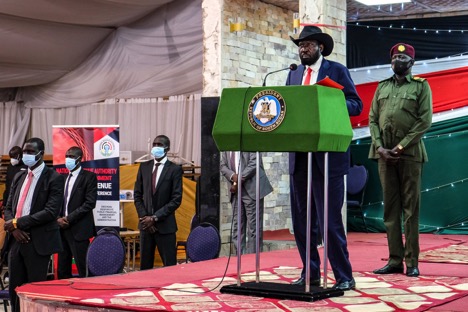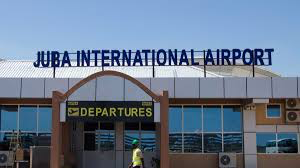
South Sudanese President Demands Politicians Stay Away from Tax Collector

South Sudan’s President Salva Kiir is demanding that politicians stop interfering in the work of the National Revenue Authority.
The National Revenue Authority is authorized by the government of South Sudan to ensure proper and accountable collection of revenue in the non-oil sector.
Endemic corruption by politicians in the country has led to them crossing paths with the authority and in some cases tending to dictate its duties.
“I appeal to politicians not to interfere with the work of the National Revenue Authority, but to work with them as technical people,” Kiir said during the opening of a high-level conference convened for State governments by the National Revenue Authority on Tuesday.
“My wish is that state governments will work with the NRA not in competition but in cooperation for the benefit of our people,” he said.
He directed the directorates of Taxation and Customs to be quickly transferred from the Ministry of Finance and Planning to the National Revenue Authority.
The conference is meant to establish a common understanding on the roles and mandate of the National Revenue Authority as well as those of State Governments, particularly the State Revenue Authorities, the body’s Commissioner General, Hon. Patrick Mugoya said.
“Our discussions during the conference will be enhanced by presentations and references to best practices in the region so we can have a consensus as the same government serving citizens, albeit at different levels,” Mugoya said.
NRA expresses optimism on Harmonized tax System
South Sudan’s National Revenue Authority has expressed optimism on the training of customs officers and clearing agents on the use of the Harmonized System (HS). The training aims at improving collection of non-oil revenue.
Dr. Patrick Mugoya, the NRA Commissioner General said the initiative will boost trainees’ capacity to effectively mobilize non-oil revenue.
“The project will also enhance the trade facilitation and would increase regional trade with South Sudan and also help the country to implement the East Africa Custom Protocols,” he said.
Dr. Mugoya was speaking during an online conference for Capacity Development of South Sudan Customs for Introduction of Harmonized System (HS) Code Phase 2 (P.I.H.S.2) supported by Japan International Cooperation Agency (JICA).
The aforesaid training on the use of HS Code Phase 2 brought together customs officers and clearing agents.
Fuyuki Sagara, JICA’s Chief Representative for South Sudan said the plan was geared towards building capacity of custom officers and clearing agents’ in line with international standards.
According to Sagara, the project was launched in April 2020 and will end in March 2023.
He added that South Sudan and Uganda will work in partnership to implement the project.
Abel Kagumire, Commissioner for Uganda Revenue Authority said the two countries will do their best to support each other.
He stated that they will continue supporting capacity building of South Sudan custom officers whenever needed.
The project is supported by Japan International Cooperation (JICA) meant to strengthen the functions of HS units, improve the operational capacity of customs officers and clearing agents based on appropriate tariff rates in the country.
It is also expected to strengthen the capacity of the custom officers in adopting to ethics during operations.
It will contribute to modernization of customs procedures by strengthening the tax collection capacity of customs officers in line with international standard.


































